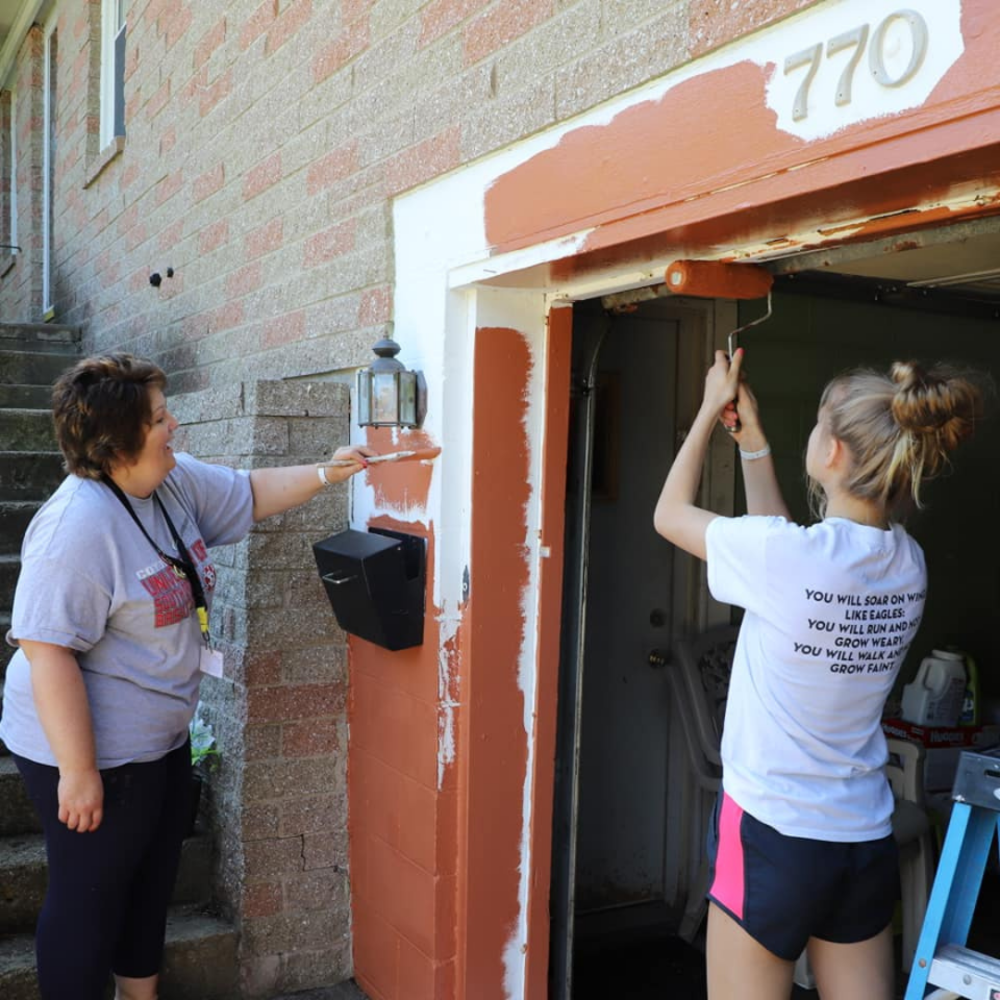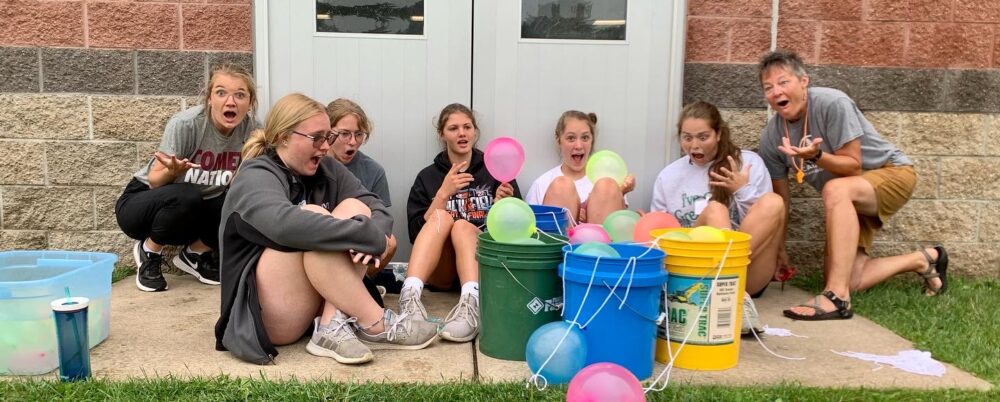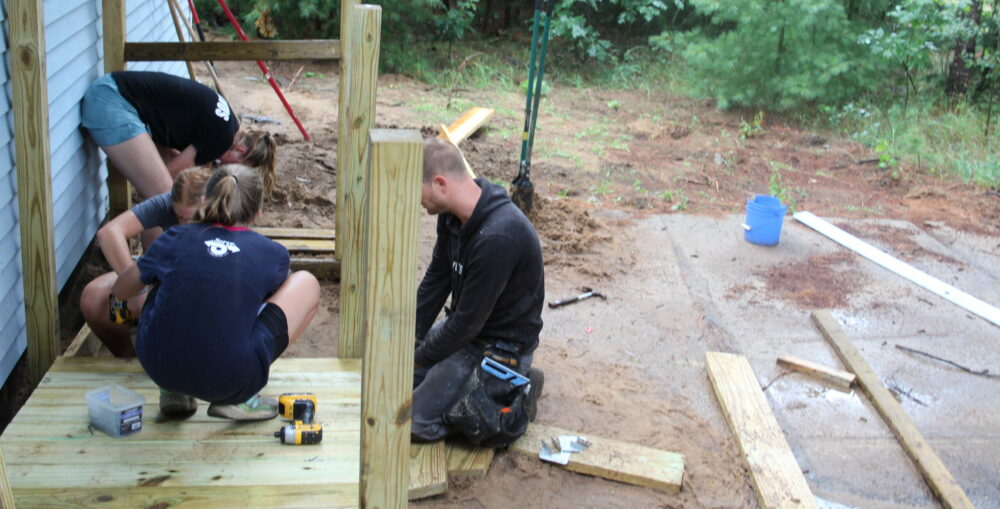Full Transcript:
Amanda:
Hello and welcome. Today I’m here with my friend, Michelle, and we’re going to talk about volunteer recruitment. We don’t do ministry alone; we do it with others. And so, what does it look like to invite others into youth ministry alongside us? So Michelle, share with us a few things. Volunteer recruitment starts and ends with this idea that God puts people in place and whom he wants to be there; he’s going to raise up to be with us.
Michelle:
Being sensitive to the spirit of the Lord and whom he is encouraging and developing and wanting to be in these spaces is really important. It’s my job to draw that out of people when I see that they’re interested, when I have conversations with parents, with other people that go to the church, just keeping my eyes and ears open for those that are being called by the Lord. We need to not forget about the youth that are involved in the program as well. Having them recommend people or talk about people that would be good additions to the ministry is always an excellent thing as well. We know it’s not necessarily the gift of everyone to work with youth. So it’s also my job to create a hospitable, welcoming environment. When people say yes to volunteering with our youth ministry, it’s really important that they feel loved, and welcomed, and valued and that their piece of the contribution is important.
Really being sensitive to the spirit of the Lord, praying for the people that are already involved, praying for the future people that are going to be involved as well is really my number one responsibility when looking for new people. I mean, anyone can put an announcement in a bulletin, or anyone can get up in front at church and say, we need volunteers for all of these ministries. But we really want people that are specifically being called to work with youth in the very interesting season of life, which is middle and high school.
Amanda:
Absolutely. Absolutely. You brought up some really great points. First, prayer is so important, to constantly be in prayer for the leaders you have and for the leaders that are coming, that are yet to be. And another thing that you brought up was it’s easy to stand up and say, we need a volunteer for all of these things. It’s important as a church staff to be collaborative in who you’re bringing on board and to be sharing those resources. We’re not competing for that one person in the congregation. And we don’t want people to be serving everywhere. It’s more than just getting a warm body in the youth room. You want to be strategic and find the right people for the right fit, I think. What are some of the things that you look for when you’re recruiting a volunteer?
Michelle:
We’re looking for people with an open mind, a teachable spirit, a servant heart. Those that obviously enjoy being around youth and educating them, walking with them, talking about the more difficult things as well, that are comfortable in those conversations that are necessary if you’re going to be working in groups with youth. So definitely look for all of those things in people that really want to be involved in this particular ministry.
Amanda:
It’s a lot of fun, but it can be intimidating for some people. And so I have found that in order to get over some of that intimidation, where, what do I have to offer a teenager? It helps to, like you said, ask the students who they may want to be a part of the youth ministry. That’s a great entry point when you’re talking to adults to say, hey, our students have noticed you and they want to learn more about you, or they want you to join us on some of these fun activities that we do. So when we’re recruiting, we also want to be recruiting with a mindset with sustainability, longevity. Tell us some more about that. What does that look like for you?
Michelle:
This ministry, as all ministries, should not revolve around one person, should not fall to the ground if one person leaves or is called to do something else. So we’re looking for sustainability. I really have enjoyed learning from the purpose-driven series all about how systems need to be put in place and ideals need to be laid down so that you can pass this on to others. Not that they would do it exactly how you’ve done it, but that there’s a framework in place. So when I took over our youth ministry, there was no mission, vision, and purpose written down on paper. I mean, I know there were things in people’s minds and hearts that they were following.
But being able to write those things down collaboratively with my co-leader and some other people really has helped to just unify that piece of it, we’re all on the same page in that way. I am a big person for organization schedules anyway. I think that that’s really important. The Lord obviously deviates us from those things sometimes, but it’s nice to always have a framework in place to go back to. In that interest, I have worked with my co-leader to develop a three-year teaching curriculum, and we have the opportunity to put new pieces into the lessons, current events, or entertainment things, or anything that we can use as a-
Amanda:
Pulling that pop culture in is so critical to youth ministry and youth culture.
Michelle:
Oh my, yes, very critical. So that we have that core lesson in place, but we can always change it up with those different things and keep it fresh and new. But everybody is on the same page there. And with all of those topics, we develop those by a lot of prayer together, a lot of discussion. We each came with lists and had to take some of our things away and add to some things as the spirit of the Lord was moving us. But again, just having those frameworks in place that if I had to step away tomorrow, another person could slide into my position. They would do it their way with their flare and their specific gifting from the Lord, but there’s somewhere to start. And we’re blessed to have a team of nine adult leaders, and it’s just been really nice to take all those different personalities and giftings and be on the same page together.
Amanda:
Absolutely. It makes it easy for somebody to come in and join wherever you are in that three-year plan. And they can see where you’ve been and they can see where you’re going, which is a good perspective for a new recruit. In this three-year plan, what things have you found that create relationship? So when you get a new person that comes in, how do you help make them feel like they’re a part of the team?
Michelle:
Sure. So obviously sharing with them where we are and where we’re going. We have a structure where we try to alternate large group and small group sessions to do teaching on the bigger ideas involved. And then to sit with smaller groups, we find that a lot more sharing takes place there. That’s a great place for our new volunteers to really be able to get to know a cohort of students. I mean, you can’t walk into a 20, 30 member youth group and get to know everyone at the same time. So that structure allows our new volunteers to jump right in with certain groups of youth. And that’s really nice. We have a focus on service in our group, service to one another, service outward to our community at large. And those aren’t just quick things that we jump in and do.
They’re long-term relationships that we’ve made both within our congregation with specific people in ministries and outside of our congregation and the community as a whole that kind of give a variety of opportunities for the youth and for leaders to engage in. That’s another great place for new adult volunteers to get to know the youth better. When it’s in a more structured setting, like our regular meeting, that can be more difficult. But if you’re just hanging out doing a service project together, serving the community together, you get that opportunity to have those conversations that are very comfortable, very organic, very natural. So I really encourage new leaders to not be afraid; we’re fortunate because most of ours are not, but do not be afraid to delve into service, to delve into smaller groups with the kids, because that’s what’s going to really allow them to start forming relationships in the group.
Amanda:
Service is such a great way to build relationships. And we always are trying to be mindful of being intergenerational, particularly with gen Z. We have noticed that they really crave mentorship relationships. And when you’re doing a service project, when you’re sorting clothes, or when you’ve got something that’s keeping your hands busy, it makes people more comfortable, and they relax, and you begin to share things. And not always big things, but those little things. The little, daily, mundane, everyday activities can do so much to build strong relationships with students with each other, as well as with those leaders. Service is also a great way to give adults just a little peek into what youth ministry is like. It’s a one-day commitment. It’s a few hours. You get to know these students; you get to know the other leaders as well. I think it’s important for those leaders to be a good team.
Michelle:
Not only are they great relationship tools, but we want to foster a lifelong love of service. And that’s why we try to offer a variety of things and make them regular. And yeah, it’s a great tool for that.
Amanda:
This brings us back to where our conversation began, of volunteer recruitment is really all about relationships and partnerships and doing ministry together because we cannot do it alone, and we’re not called to do it alone. We need others to come alongside and to join in the joy, and the fun, and the work that’s youth ministry.


